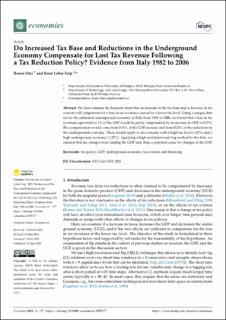| dc.contributor.author | Orsi, Renzo | |
| dc.contributor.author | Seip, Knut Lehre | |
| dc.date.accessioned | 2023-06-30T08:26:10Z | |
| dc.date.available | 2023-06-30T08:26:10Z | |
| dc.date.created | 2023-06-27T13:28:35Z | |
| dc.date.issued | 2023 | |
| dc.identifier.issn | 2227-7099 | |
| dc.identifier.uri | https://hdl.handle.net/11250/3074652 | |
| dc.description.abstract | We here examine the frequent claim that an increase in the tax base and a decrease in tax evasion will compensate for a loss in tax revenues caused by a lower tax level. Using a unique data set for the estimated underground economy in Italy from 1982 to 2006, we found that a loss in tax revenues equivalent to 1% of the GDP would be partly compensated by an increase in GDP of 0.55%. The compensation would come from 0.31% of the GDP increase and from 0.24% of the reductions in the underground economy. These results apply to an economy with a high tax level (>32%) and a high underground economy (about 25%). Applying a high-resolution lead–lag method to the data, we ensured that tax changes were leading the GDP and, thus, a potential cause for changes in the GDP. | en_US |
| dc.language.iso | eng | en_US |
| dc.rights | Navngivelse 4.0 Internasjonal | * |
| dc.rights.uri | http://creativecommons.org/licenses/by/4.0/deed.no | * |
| dc.title | Do Increased Tax Base and Reductions in the Underground Economy Compensate for Lost Tax Revenue Following a Tax Reduction Policy? Evidence from Italy 1982 to 2006 | en_US |
| dc.type | Peer reviewed | en_US |
| dc.type | Journal article | en_US |
| dc.description.version | publishedVersion | en_US |
| cristin.ispublished | true | |
| cristin.fulltext | original | |
| cristin.qualitycode | 1 | |
| dc.identifier.doi | 10.3390/economies11070177 | |
| dc.identifier.cristin | 2158664 | |
| dc.source.journal | Economies | en_US |

